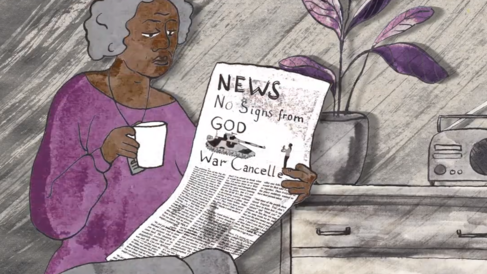
In 2017, a New York Times opinion piece cited the work of CIP’s Dr Daniel Weiss to make a case that Christians should support gun control. The writer, Richard Parker, drew on an article Daniel had published in the Journal of Religious Ethics.
As part of a wider body of work on religious responses to violence, Daniel was weighing up how Thomas Aquinas would react to modern warfare. Aquinas, a major 13th-century Christian thinker, provided the foundations for so-called Just War Theory. As Parker quoted, Daniel had judged that, “Aquinas holds that causing the death of innocents in a foreseeable manner, whether intentionally or indirectly, is never justified.”
Alerted by the Op Ed, Victoria James compiled a feature for CAM, the University of Cambridge's alumni magazine, exploring the ethics of warfare and technological advances with Daniel alongside researchers in Gender Studies and Political Sociology. The article is accompanied by a series of photographs, No Lone Zone, from documentary photographer Adam Reynolds.
An opening extract is given below—the whole piece is available to read (free) in issue 93 of CAM magazine (online and in print).
Just War?
The idea that war is justified in specific circumstances has held sway for almost two millennia – but as technology evolves, can it hold?
Eight hundred-year-old theological deliberations don’t often make it into the opinion pages of The New York Times. But that’s what happened when Dr Daniel Weiss, Senior Lecturer in the Faculty of Divinity, found his analysis of St Thomas Aquinas’s stance on ‘just war’ invoked in the US debate on gun control. The Times op-ed’s author asserted that “Christianity…. insists on the protection of the innocent”, and cited a paper by Weiss that read: “Aquinas holds that causing the death of innocents in a foreseeable manner, whether intentionally or indirectly, is never justified.”
“It was certainly a surprise,” says Weiss, who is also actively involved in the Cambridge Interfaith Programme. In response, a conservative publication, the National Review, took a different line. If Aquinas had held such a view, it argued, “it would mean that he had practically endorsed pacifism – since even a just war of self-defence entails foreseeably, although unintentionally, causing the death of innocents”. Weiss found the whole exchange fascinating. “There’s clearly a desire to have Aquinas as an authoritative source in relation to contemporary discussions of just war,” he says. “His work is still a touchstone.”
Gun control is only one of many contexts in which just war thinking is being re-examined. Technology such as drone warfare or facial recognition is blurring boundaries between supposedly passive surveillance and active aggression. And the growing visibility of social justice movements is prompting a greater willingness to re-examine the most fundamental concepts that a just war entails: what are the nation states that wage war? Whose bodies are those protected or eliminated?
Read James' CAM piece in full (July 2021): Just War? - CAM Digital | University of Cambridge
Read Parker’s article (November 2017): Opinion | Why Christians Must Support Gun Control - The New York Times (nytimes.com)
Read Weiss on Aquinas (2017): Aquinas's Opposition to Killing the Innocent and its Distinctiveness within the Christian just War Tradition—Journal of Religious Ethics (via Wiley Online Library)
Dr Daniel Weiss’s latest book continues the theme, exploring historical and modern Jewish understandings of war and violence: Modern Jewish Philosophy and the Politics of Divine Violence
